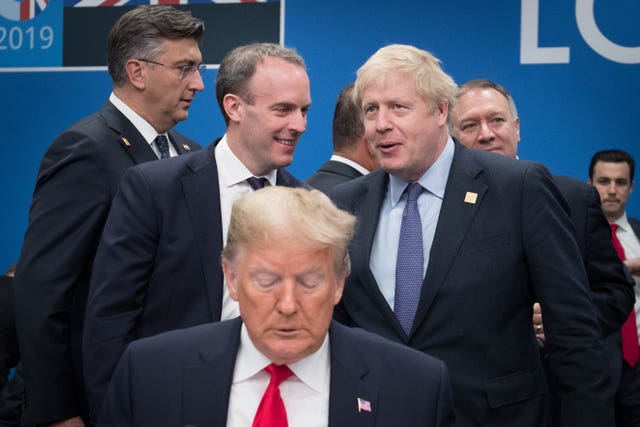Dominic Raab defends US as Iran ramps up criticism amid soaring tensions
The Iranian foreign minister said the US presence in the Middle East was ‘malign’.

The Foreign Secretary has defended the US over its killing of Iran’s top military leader as Tehran ramped up its criticism amid soaring tensions in the Middle East.
Dominic Raab accused hardliners in Tehran of “nefarious behaviour”, described General Qassem Soleimani as a “regional menace” and said the United States has the “right of self defence”.
Mr Raab on Sunday declined to say the US President was right in his actions but criticised the head of Iran’s elite Quds Force who was killed in Iraq on Friday as a “regional menace” who was destabilising the Middle East and “attacking Western countries”.
“The US will take their own operational judgment call but they’ve got the right of self defence,” he told Sky’s Sophy Ridge on Sunday.
“So we understand the position the US were in and I don’t think we should be naive about the Iranian Revolutionary Guard or indeed General Soleimani.”
Mr Raab said the case of Nazanin Zaghari-Ratcliffe, the British-Iranian mother jailed in Iran, remained “at the forefront of my mind” and accused hardliners in Tehran of “nefarious behaviour” and not complying with international law.
But he urged a diplomatic route to be pursued to allow “Iran to come in from the international cold”.
The Foreign Secretary also defended Boris Johnson, saying he has been in “constant contact” with the Prime Minister who remained “in charge” throughout his Caribbean holiday during the crisis.
Mr Raab, who is due to meet with US Secretary of State Mike Pompeo in Washington on Thursday, said he has been in contact with the Iraqi prime minister and president and will be speaking to Iran’s foreign minister.

Mr Zarif accused Mr Trump of having “committed grave breaches” of international law with the killing and of threatening to commit a “war crime” by targeting cultural sites.
“Whether kicking or screaming, end of US malign presence in West Asia has begun,” Mr Zarif tweeted.
Labour’s shadow foreign secretary Emily Thornberry accused the PM of dismissing her concerns that Mr Trump was heading down a dangerous path by working to tear up the nuclear treaty with Iran.
With the US sending 3,000 extra troops to Kuwait, she warned of a “lurch towards war” arising from the president’s “reckless” decision to kill the general who masterminded Iran’s regional security strategy.
The Foreign Office issued strengthened travel advice to Britons across the Middle East including Saudi Arabia and Turkey, while the Navy was to begin accompanying UK-flagged ships through the key oil route of the Strait of Hormuz.
Meanwhile, military chiefs were understood to have ordered 400 soldiers training local forces in Iraq to scrap their duties to switch to “force protection” to defend themselves and British diplomats from revenge strikes.
Mr Johnson was due back in Downing Street on Sunday as he returned home from the private island of Mustique where he celebrated the New Year with his partner Carrie Symonds.
But he was to face a spiralling diplomatic crisis and growing criticism for failing to issue a statement over the air strike.
Outgoing Labour leader Jeremy Corbyn said: “Boris Johnson should have immediately cut short his holiday to deal with an issue that could have grave consequences for the UK and the world.”
Acting Lib Dem co-leader Sir Ed Davey said Mr Johnson’s “silence on Trump’s dangerous assassination in Iraq is deafening”.
On Sunday, Ms Thornberry accused the PM of having “other preoccupations” as he was “sunning himself” while Cabinet Secretary Sir Mark Sedwill chaired Cobra meetings.





